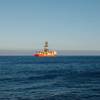Transport Canada has strengthened its security requirements for vessels, marine facilities and ports by establishing the Marine Transportation Security Regulations.
"The Government of Canada is committed to maintaining the safety and security of Canadian ports," said Transport Minister Tony Valeri. "The Marine Transportation Security Regulations will further enhance marine security across Canada and abroad."
These regulations, which have been approved by the Governor in Council for publication in the Canada Gazette, Part II on June 2, 2004, will implement the requirements of the International Maritime Organization's (IMO) International Ship and Port Facility Security Code, as well as amendments to its Safety of Life at Sea Convention, 1974. The IMO is a specialized agency of the United Nations which focuses on improving safety at sea and preventing pollution from vessels.
Transport Canada's regulations apply to all commercial vessels of 500 tons (gross tonnage) or more, or carrying more than 12 passengers and travelling between countries, and marine facilities and ports serving such vessels. They require the completion of security assessments and security plans, and the designation of security officers.
In addition, the regulations surpass the IMO requirements by extending them to:
cargo vessels of 100 tons (gross tonnage) or more other than towing vessels;
towing vessels that tow barges carrying certain dangerous cargoes; and
marine facilities and ports that serve the above vessels.
In order to enhance marine security in Canada and to help ports and port facilities meet these new requirements, the Government of Canada recently established the $115 million Marine Facility Security Contribution Program.
This latest marine security initiative builds on other significant actions already taken by the Government of Canada to enhance marine security since September 11, 2001.
These actions include, among others:
committing $308 million to strengthen marine security;
committing $115 million for the Marine Facility Security Contribution Program to assist ports and port facilities with security enhancements;
requiring vessels to provide at least 96 hours advance notice before they enter Canadian waters;
introducing new boarding protocols to improve the response to threats before vessels arrive at Canadian marine facilities or ports;
establishing enhanced security procedures, in partnership with the United States, for vessels entering the Great Lakes - St. Lawrence Seaway system;
working with international partners to develop new marine international security requirements; and
committing $172.5 million for a broad range of initiatives to enhance the security of Canada's marine transportation system and maritime borders including the use of aerial surveillance and vessel monitoring systems, such as automatic identification systems, which will enhance Canada's ability to track vessels entering and operating in Canadian waters.
The Marine Transportation Security Regulations have been established in order to meet the International Maritime Organization's July 1, 2004 deadline for implementation of the Security Code requirements.
Sponsored Content
Chris-Marine’s solutions help to prolong engine lifetime

Subscribe for
Maritime Reporter E-News
Maritime Reporter E-News is the maritime industry's largest circulation and most authoritative ENews Service, delivered to your Email five times per week









